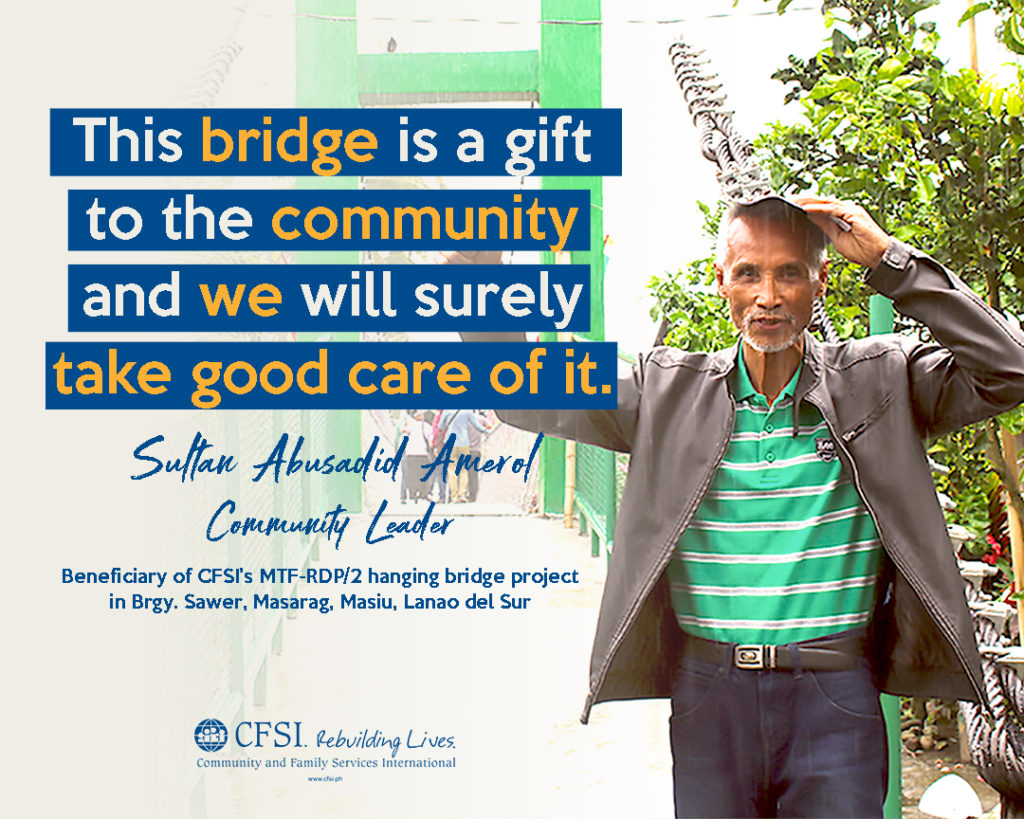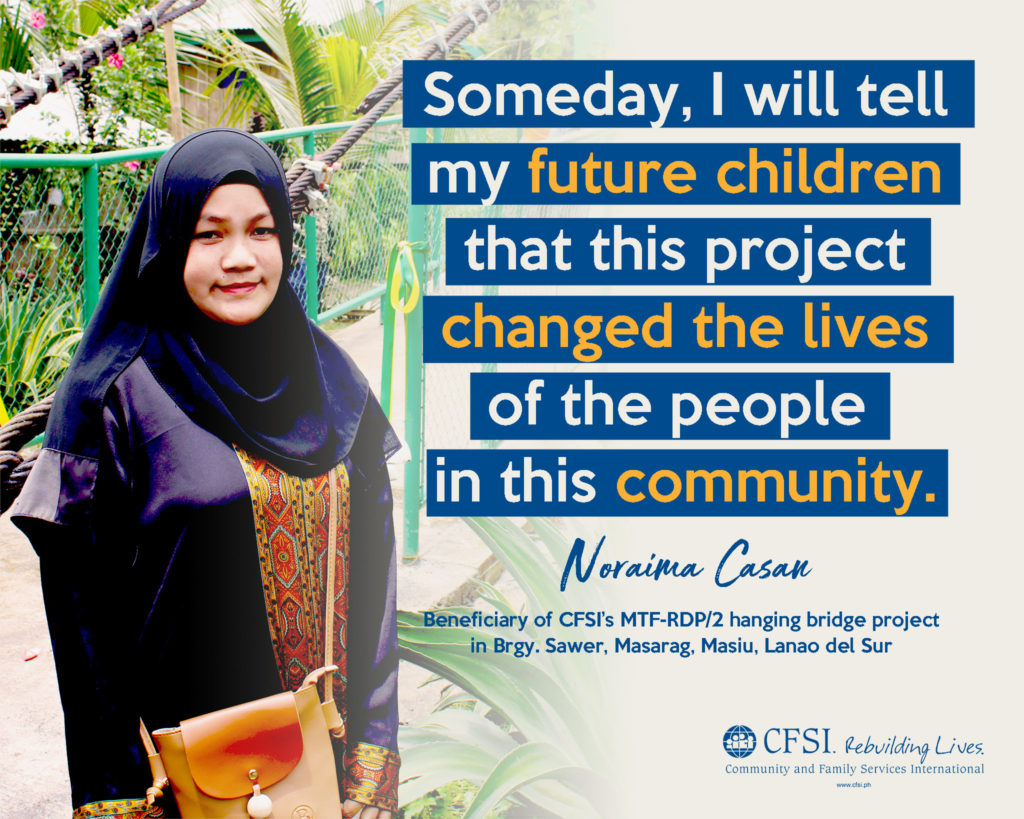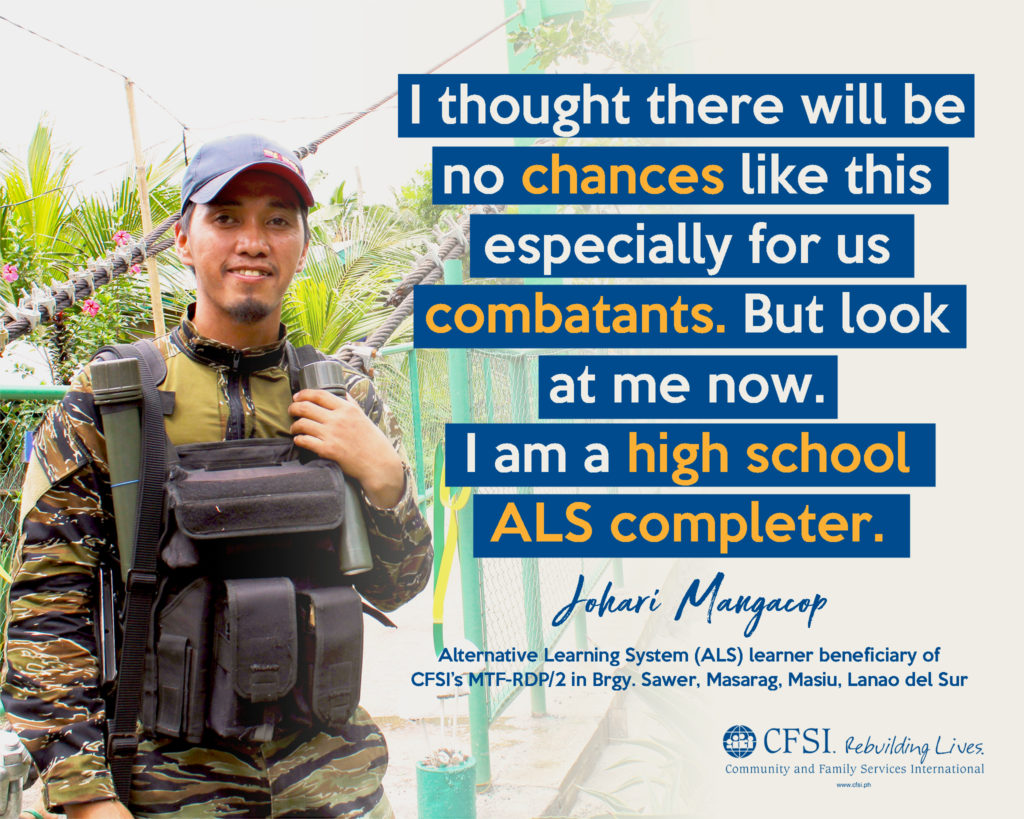Testimonies of Barangay Sawer, Masarag, Masiu, Lanao del Sur community members
The isolated community of Barangay Sawer, Masarag in the Municipality of Masiu, Lanao del Sur was used to be a safe harbour for Moro Islamic Liberation Front (MILF) guerrilla fighters during the past armed clashes. Long before it was considered as a satellite camp for Camp Bushra Somiyorang, one of the six previously acknowledged camps of the MILF, Barangay Sawer is considered inaccessible to common people. Elusive as it may seem, it became a shelter for the families of former combatants and to a community displaced from the outburst of the warfare.
The 2014 Comprehensive Agreement on the Bangsamoro (CAB) paved the way for various development opportunities and intervention for the MILF communities. The Mindanao Trust Fund-Reconstruction and Development Project (MTF-RDP) was a product of CAB implemented through the Community and Family Services International (CFSI), which supports the ‘transitional assistance for post-conflict reconstruction and development in conflict-affected areas in Mindanao.’
Sawer, Masiu is one of the targeted communities provided with socio-economic infrastructure project under the MTF-RDP Phase II. With the completion of the hanging bridge with 200-meter pathway sub-project and the implementation of Alternative Learning System (ALS), community members narrate the stages of change brought by these developments.
—–

Sultan Abusadid Amerol has been living in the far-flung village of Barangay Sawer for 20 years. This 61-year-old camp commander also takes a vital role in the decision making as a community leader. He is also a farmer whose main source of living relies on agricultural crops such as rice and corn.
“Although most of the residents here are combatants, we also do farming to sustain our daily needs,” said Sultan Abusadid.
But the struggle does not only lie on earning a living in this remote area alone. They have to pass through a hilly route, take challenging walks, and cross a rocky stream with strong current to deliver their products to the marketplace.
“We cannot carry all the sacks together, so we have to hire horses to carry the products. We pay 25 Pesos per sack and walk with the horses for almost an hour to reach the highway up to the capital to sell the goods,” he stated.
But today, those struggles are just a thing in the past.
“When MTF-RDP/2 was introduced to us, I am beginning to see various changes in the community. People from CFSI and BDA [Bangsamoro Development Agency] often visit us to share lessons about community development. I saw how excited and participative the community members were with this project,” he uttered.
Being the community leader, Sultan Abusadid has to closely monitor the construction of the hanging bridge project. He is happy to see the completed structure now in place.
“I am glad that all our sacrifices have paid off,” he stated with relief.
With the presence of the bridge and the additional pathwalk, residents no longer cross the treacherous river by foot, and it only takes them 30 minutes to reach the national highway compared to an hour of walk before.
“This project is a gift to the community and we will surely take good care of it,” he concluded.
—–

Noraima Casan, 26, spent most of her life in this quiet town of Masiu. She and her siblings were raised with both parents who are farmers. Her father was also a former combatant.
Seeing how difficult life is in this sheltered place, Noraima dreamt of being a professional in the future. But this dream suddenly faded away when she was not able to finish school.
Noraima recalled how hard it was to reach school in the past.
“I remember how dangerous we have to cross that river and how far we have to walk first before reaching school. Oftentimes, we have to attend school with our wet clothes,” she shared.
Noraima described the struggles people experience in their community in terms of access which interfered their right to education. Most of the residents were unable to complete school because of these circumstances.
“I was just hoping that one day, a great opportunity will happen for us,” she said.
She had no idea that after several years, new developments are bound to transpire in their community.
“One day, this project (MTF-RDP/2) was introduced to us. I heard that they will construct a bridge and thought that this was my long-time dream for the community. People will no longer worry about the risks in crossing the river and children will be able to get to school safely,” she declared.
Eager to pursue her dreams, Noraima also completes the Alternative Learning System (ALS) sessions offered by the project. She finished secondary level.
“The program (ALS) reached us though we are in a far-off place, so I considered this as an opportunity for me to reach my sought after dream despite the fact that I am already married,” she said.
Noraima’s husband is also a farmer just like her parents, hence she is much aware of the previous challenges in the process of transporting the products.
“With the completion of the bridge, we do not have to worry with our crops getting soaked in the water while crossing the river. We can now deliver quality products without reducing the price, and lessen the consumption in the delivery to the market,” she added.
With great appreciation she expressed her gratitude and uttered, “Someday I will tell my future children that this Project (MTF-RDP/2) changed the lives of the people in this community.”
—–

Johari Mangacop, 28, grew up outside of this community. But he claims to have the best of his life when he transferred in Barangay Sawer 10 years ago.
Johari is currently assigned in the Hejratussalam Satellite Camp of Camp Bushra Somiyorang located in the barangay.
“I think opportunity really brought me here. The chance to avail the ALS is once in a lifetime especially in faraway areas like ours,” he added.
Johari had to stop going to school when he was in third year high school. The ALS Program of the MTF-RDP/2 gave him an avenue to atleast complete his halted high school education.
“I thought there will be no chances like this especially for us combatants. But look at me now. I am a high school ALS completer,” he uttered with smile.
—–
MTF-RDP/2 is a project partnership agreement between CFSI and Bangsamoro Development Agency (BDA). The program seeks to improve access to basic socio-economic infrastructure and Alternative Learning System (ALS) of identified beneficiary communities in conflict-affected areas in Mindanao, particularly the six previously acknowledged camps of the MILF such as Camp Abubakar as-Siddique, Camp Badre, Camp Bilal, Camp Bushra Somiyorang, Camp Omar, and Camp Rajamuda.
The MTF is a multi-donor trust fund supported by benefactors such as the European Union, the government of Sweden, Australia, Canada, United States, New Zealand, and the World Bank. The World Bank functions as Trust Fund Administrator of the MTF. #

